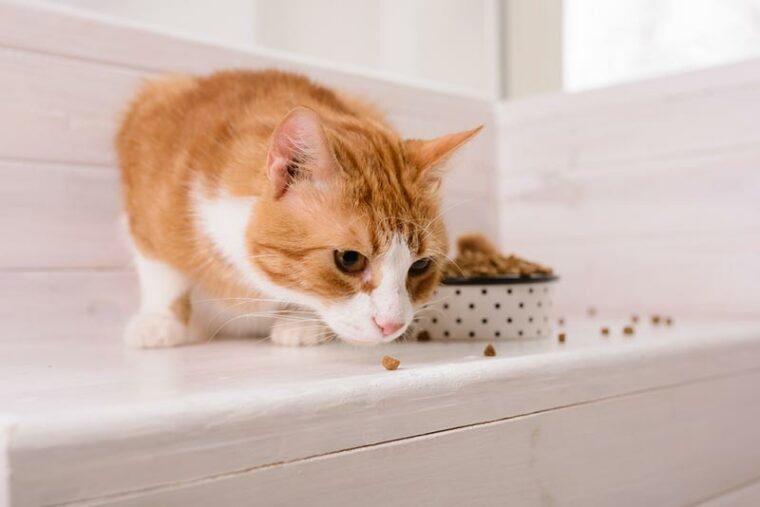
Click to Skip Ahead
As your cat ages, it will start losing weight, which is part of the natural aging process. If you’ve noticed your senior cat losing weight, it’s because the cat’s metabolism is slowing down, activity is decreasing, and it will start to lose muscle mass.
Though this is a natural part of aging, it’s also something that isn’t easy for pet owners, and you can do everything you can to help your old cat gain enough weight to be happy. If you’re unsure what to feed your cat, keep reading, and we’ll give you six great things to provide your senior feline pal to help them gain weight and stay as healthy as possible.
The 6 Things to Feed an Old Cat to Help Them Gain Weight
1. High-Calorie Content
If you want your senior cat to gain weight, you’ll need to purchase food high in calories. Purchasing high-calorie food for your cat means that the cat will get more nutrients in every mouthful. If your cat has gotten to the point where he eats very little, the calorie-dense food will ensure that each bite he does take is packed with calories.
One of the best ways to do this is by feeding your senior feline kitten food instead of adult cat food. Kittens are constantly growing, and their food is packed with nutrients, protein, vitamins, and minerals. These foods are incredibly high in calories to keep up with your kitten’s energy. While it is made for growing kittens, it’ll help your senior cat gain weight.
It’s best to contact your vet before changing your senior cat’s food to kitten food.
2. Canned Wet Food
As a cat ages, its teeth age with it, meaning they aren’t as tough as they used to be, and it’s hard to chew the dry kibble your cat might be used to. Many elderly cats suffer from dental issues, which can also make it painful to eat dry kibble. The painful chewing can cause your cat’s appetite to fade rapidly.
Wet food encourages the cat to eat more because it’s softer on its teeth and gums. Also, wet food is easier to digest for senior cats and is better for their gastrointestinal and digestive tracts. If you heat the wet food just a touch, it could also make it more appetizing for the cat since heating it up will activate the smell, which could entice your older cat to try it.
3. Smaller and More Frequent Portions
Another way to get your senior friend to eat is by feeding it smaller and more frequent portions of food. Older pets struggle to digest food, so one larger meal in the morning and one at night might be too much for the cat’s digestive system. If you, instead, split their food into five or six smaller meals a day, it should be easier for your cat to handle.
This is also a good idea if your cat throws up after it eats or has runny poops, which are signs of digestive problems in your feline. Smaller and more frequent meals help them keep the food down and absorb some of the nutrients.
4. Diet Supplements
If you still can’t get your older cat to gain weight after all of these tips, you might consider giving the cat dietary supplements. You can get these supplements in gels and easily add them to your cat’s food. The supplements contain very high levels of protein, vitamins, and minerals.
If you’re unsure of which supplements you need to give your elderly cat, you can talk to associates at your local pet store, or better yet, get in touch with your vet for recommendations.
5. Low Phosphorus and Low Sodium Diet
As cats get older, they often begin to suffer from kidney problems, which means you need to switch them to a low phosphorus and low sodium diet. If your cat has kidney disease, a diet with high phosphorus levels can make the disease worse and make it progress more quickly.
Sadly, there are quite a few calorie-rich cat foods that contain high levels of phosphorus and sodium, so you need to read the ingredients on the cat food before giving it to your cat. If you’re in doubt, it’s best to consult your vet before making the change.

6. Homemade Treats
Just because your cat is aging doesn’t mean it will stop being a picky eater if it always was, and some of the foods above may not be appealing. It is possible that you can tempt your cat with homemade treats. Make sure that whatever you cook is free of spices and salt, as these could upset your cat’s digestive system. Healthy homemade treats might work well to tempt your senior cat to eat.
Possible Reasons Older Cats Lose Weight
Other than their ages, there are a few reasons older cats tend to lose weight. We’ll list a few of those reasons in the list below.
What If Your Older Cat Refuses to Eat?
If your older cat refuses to eat, it could mean that the end is coming near, and there isn’t much you can do. You can try to tempt the cat and take it to the vet to see if anything can be done, but chances are there isn’t. You have to be prepared for your vet to tell you there is nothing you can do and suggest putting your pet to sleep.
Conclusion
While cats tend to start losing weight when they get older, you can try to tempt your cat and make sure that you change its food to something it can tolerate. If your cat continues not to eat and is steadily getting weaker, it’s best to take the cat to your vet and see if anything can be done to improve its condition.
See also:
Featured Image Credit: Elena Spac, Shutterstock






